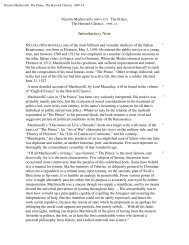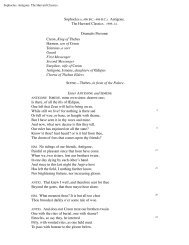Notre Dame de Paris - Bartleby.com
Notre Dame de Paris - Bartleby.com
Notre Dame de Paris - Bartleby.com
Create successful ePaper yourself
Turn your PDF publications into a flip-book with our unique Google optimized e-Paper software.
The word acted on the truands like the or<strong>de</strong>r to mount on a regiment, and the entire band—men,<br />
women, and children—poured out of the tavern with a great clatter of arms and iron. The moon was<br />
obscured. The Court of Miracles lay in utter darkness—not a single light was to be seen, but it was far<br />
from being <strong>de</strong>serted. A great crowd of men and women stood in the Place talking to one another in low<br />
voices. There was a continuous <strong>de</strong>ep hum, and many a weapon flashed in the gloom.<br />
Clop in mounted on a great stone. “To your ranks, Argot!” cried he. “To your ranks, Egypt! To your<br />
ranks, Galilee!”<br />
A movement ran through the darkness. The vast multitu<strong>de</strong> seemed to be forming in columns. After a few<br />
minutes the King of Tunis once more lifted up his voice:<br />
“Now, then, silence on the march through <strong>Paris</strong>! The password is ‘Dagger in pouch.’ Torches not to be<br />
lighted till we reach <strong>Notre</strong> <strong>Dame</strong>! March!”<br />
Ten minutes later the horsemen of the night-watch were fleeing in terror before a long procession,<br />
black and silent, pouring down towards the Pont-au-Change through the tortuous streets that run in<br />
every direction through the <strong>de</strong>nse quarter of the Halles.<br />
IV. An Awkward Friend<br />
QUASIMODO on that night was not asleep. He had just gone his last round through the church. He had<br />
failed to remark that at the moment when he was closing the doors the Arch<strong>de</strong>acon had passed near him<br />
and evinced some annoyance at seeing him bolt and padlock with care the enormous iron bars which<br />
gave the wi<strong>de</strong> doors the solidity of a wall. Dome Clau<strong>de</strong> seemed even more preoccupied than usual.<br />
Moreover, since the nocturnal adventure in the cell, he treated Quasimodo with constant unkindness; but<br />
in vain he used him harshly, sometimes even striking him—nothing could shake the submissive patience,<br />
the <strong>de</strong>voted resignation of the faithful bell-ringer. From the Arch<strong>de</strong>acon he would endure<br />
anything—abuse, threats, blows—without a murmur of reproach, without even a sigh of <strong>com</strong>plaint. The<br />
utmost that he did was to follow Dome Clau<strong>de</strong> with an anxious eye if he mounted the stair of the tower;<br />
but the Arch<strong>de</strong>acon had of himself abstained from appearing again before the gipsy girl.<br />
That night, then, Quasimodo, after a glance at his poor forsaken bells, Jacqueline, Marie, Thibauld,<br />
had ascen<strong>de</strong>d to the top of the northern tower, and there, after setting down his dark-lantern on the<br />
leads, he fell to contemplating <strong>Paris</strong>. The night, as we have said, was very dark. <strong>Paris</strong>, which, speaking<br />
broadly, was not lighted at all at that period, presented to the eye a confused mass of black blots, cut<br />
here and there by the pale windings of the river. Quasimodo saw not a light except in the window of a<br />
distant edifice, whose vague and sombre outline was distinguishable high above the roofs in the direction<br />
of the Porte Saint-Antoine. Here, too, some one kept vigil.<br />
While his eye thus lingered over the dark and misty scene, the bell-ringer felt an in<strong>de</strong>scribable sense of<br />
anxiety rising within him. For several days he had been on the watch. He had constantly noticed men of<br />
sinister aspect loitering round the church and never taking their eyes off the gipsy girl’s hiding-place. He<br />
feared lest some plot should be hatching against the unfortunate refugee. He conceived her to be an<br />
object of popular hatred, as he was himself, and that something might very well be going to happen in<br />
the immediate future. Thus he remained on his tower on the lookout—“Revant dans son revoir”—Musing<br />
in his musery—as Rabelais says, his eye by turns on the cell and on <strong>Paris</strong>, keeping safe watch, like a<br />
trusty dog, with a thousand suspicions in his mind.










